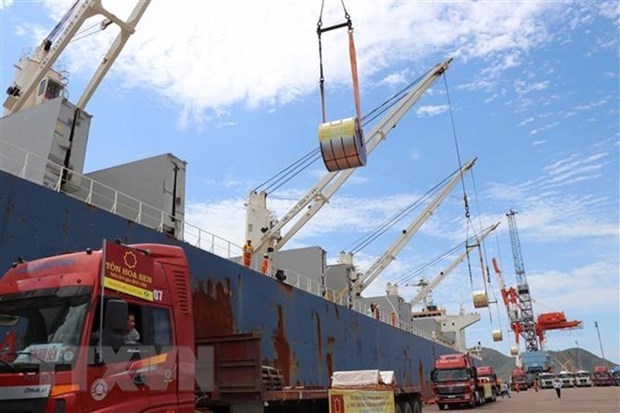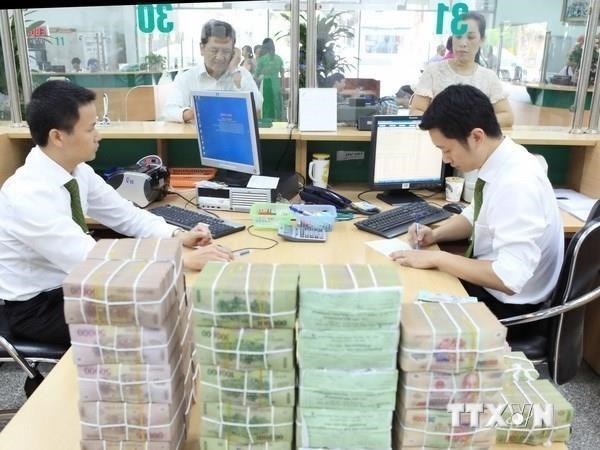Vietnam’s economic growth could hit 6.3 percent this year: VEPR
 Vietnam should gradually build a fiscal buffer to prevent shocks that are similar to the COVID-19 shock as well as unexpected developments of this pandemic in coming years. Illustrative photo. (Photo: VNA)
Vietnam should gradually build a fiscal buffer to prevent shocks that are similar to the COVID-19 shock as well as unexpected developments of this pandemic in coming years. Illustrative photo. (Photo: VNA)
VEPR’s report said the global economy has shown signs of recovery thanks to confidence boosted by the availability of COVID-19 vaccines, but uncertainties remain while growth is uneven among nations and economies.
In the first quarter of this year, Vietnam’s economy maintained a growth rate of 4.48 percent, equal to the rate of the previous quarter, thanks to the Government’s drastic actions to control the pandemic from the early stages, along with the signing of the European Union – Vietnam Free Trade Agreement (EVFTA) and the EU-Vietnam Investment Protection Agreement (EVIPA).
Additionally, disbursement of public investment capital and progress of key public investment projects have been accelerated while the wave of investment and trade is shifting to Vietnam, helping maintain a stable macro-economic environment with inflation kept under control.
However, Anh also warned that Vietnam was facing challenges in an uncertain economic environment. The resurgence of COVID-19 in many countries resulting in lockdown measures is prolonging the disruption of supply chains this year, weakening the resilience of enterprises. Geo-political conflicts among large countries can cause an open economy like Vietnam to suffer.
 Illustrative photo. (Photo: VNA)
Illustrative photo. (Photo: VNA)He further said that the vulnerability of the Vietnamese economy also comes from endogenous risks, such as the significant fiscal imbalance, the slow speed and low level of development investment, especially in infrastructure.
Other risks include the health of the banking-financial system, which has been gradually strengthened but remained vulnerable; the heavy dependence of growth on the FDI sector and the lack of autonomy in technology and raw materials; the low labour quality; inefficient public investment and rapacious public apparatus; the delay of the SOE equitization process; and the unsupportive business and institutional environment.
The VEPR suggested that the top priority should be given to social security policies which need to proceed quickly and target the right people to prevent them from falling into unnecessary tragedies.
In particular, the policy implementation needs to focus on workers in the informal sector as this group accounts for a majority, is vulnerable, suffers the most, and face difficulties in accessing supportive policies.
Meanwhile, policies to support businesses also need to continue to be implemented urgently and practically with right targets and in line with businesses’ needs.
The freezing or suspension and exemption or reduction of businesses’ financial costs such as loan interest and land rent should continue to be implemented, and it is also necessary to consider cutting trade union fees to support businesses.
For businesses that are not affected by the pandemic or even have an efficient transformation, the government should encourage credit and create conditions in terms of institutional environment and sector policy.
In case there are policy ideas to support specific businesses, these policies should aim to stimulate demand and assist consumers in paying the costs of purchasing the products and services of these businesses instead of directly financing the company.
Anh said from the VEPR’s perspectives, tax breaks or reduction, if any, should only be applied to Value Added Tax (VAT) instead of Corporate Income Tax (CIT) as CIT deduction only supports a small number of businesses that either are not affected or benefit from the impacts of the pandemic and does not help a majority of companies that are facing difficulties.
Hence, the CIT reduction is also likely to deepen the inequality within the business environment, adversely affecting the post-pandemic economic recovery, he noted.
 The asset bubble has been seen on the stock and real estate markets. Illustrative photo. (Source: VNA)
The asset bubble has been seen on the stock and real estate markets. Illustrative photo. (Source: VNA)Monetary policies, particularly interest rate instruments in 2021, will be significantly less effective. In particular, it should be noted that the asset bubble is forming on the stock and real estate markets.
In fact, property markets have seen impressive growth last year mainly because they are the parking for idle money of investors and households, which is understandable during such a period of crisis.
However, the continuous lowering of deposit interest rates caused by the decline in credit demand pushes the flow of savings out of banks at a faster pace, he warned.
Anh said Vietnam should gradually build a fiscal buffer to prevent shocks that are similar to the COVID-19 shock as well as unexpected developments of this pandemic in coming years./.












